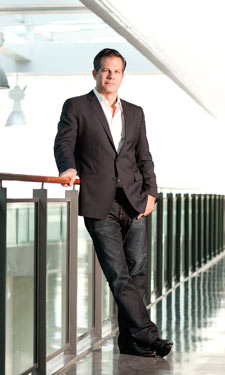 People care for and protect the places they love. And, just as importantly, they tend to stay in and invite others to those places. Richard Florida, a professor at the University of Toronto’s Rotman School of Management, is a long-time observer of public spaces whose work focuses on the common factors and the socioeconomic impact of this “community attachment.” In our shift from an industrial- to a knowledge-based economy, abundant, walkable, “serendipitous” public spaces have come to represent the new gold standard of community attractiveness, Florida says. “A park is not a frivolity.”
People care for and protect the places they love. And, just as importantly, they tend to stay in and invite others to those places. Richard Florida, a professor at the University of Toronto’s Rotman School of Management, is a long-time observer of public spaces whose work focuses on the common factors and the socioeconomic impact of this “community attachment.” In our shift from an industrial- to a knowledge-based economy, abundant, walkable, “serendipitous” public spaces have come to represent the new gold standard of community attractiveness, Florida says. “A park is not a frivolity.”
In fact, local park systems provide (or have the potential to provide) the quality-of-life assets Americans claim to value most highly. He recaps the findings of the Knight Foundation’s 2009 “Soul of the Community” survey of 28,000 people by Gallup: Aesthetic appeal, inclusiveness, and opportunities to interact with other people ranked as the top three determinants of residents’ attachment to their communities.
In his books, including The Rise of the Creative Class, Florida documents major economic shifts that may explain these priorities. Public lands and green spaces are integral to the new knowledge economy in obvious and not-so-obvious ways, he contends. As corporate recruiters have discovered, skilled professionals demand outdoor recreational experiences close to home. Yet the sprawling built environment of many U.S. cities and suburbs are neither walkable nor recreation-friendly; they are, rather, vestiges of an automobile-centered, industrial-age mindset.
“We have damaged our cities in terrible ways, and we need to change,” he says, pointing out that the communities Americans of all demographic groups find most appealing are green and walkable—and they feature town or city centers that offer a vibrant, accessible “functional core.”
Job demands are changing in ways that may make parks a more central part of adults’ daily lives, he notes. Eighty percent of the American workforce now holds skilled “knowledge jobs” in which daily productivity is measured by intellectual output. This “creative class,” as Florida has dubbed them, tend to favor a flexible workday rhythm in which productive, focused work time alternates with periodic breaks for outdoor exercise and social interaction.
“Our models of urbanism have been concrete,” Florida explains. “What we’re finally beginning to figure out is that the ‘green city’ is vitally important….The good news is that some cities have come to understand that great parks can rally citizens and hold communities together…and the most far-seeing mayors realize that.” He cites New York’s High Line and Chicago’s nascent Low Line linear park project as powerful examples of communities transforming old industrial-age infrastructure into unusual and magnetic parks. And Florida’s own thinking about urban parks as economic drivers, he says, took shape as he studied the vital role Pittsburgh’s Schenley Park plays in attracting and retaining talent for that city.
While cities around the United Sates are taking steps to expand and green their public spaces, Florida worries about the suburbs and exurbs. “When I drive through suburban areas, I don’t see many parks….[Instead] everyone has their own private green space.”
There may be no simple solutions to that problem, but the success of many “brown fields to green fields” initiatives around the country should encourage suburban communities to consider the public-use potential of vacant or under-utilized land.
Parks, whether urban or suburban, “are the universal connectors” that create more desirable lifestyles and chip away at individuals’ isolation, while inspiring love of place. Florida advises park professionals to go before elected officials armed with facts like the Gallup survey results. If they communicate their message clearly, “the availability of green space resonates with the public just as much as the need for police and schools.”
Maureen Hannan is Senior Editor of Parks & Recreation

